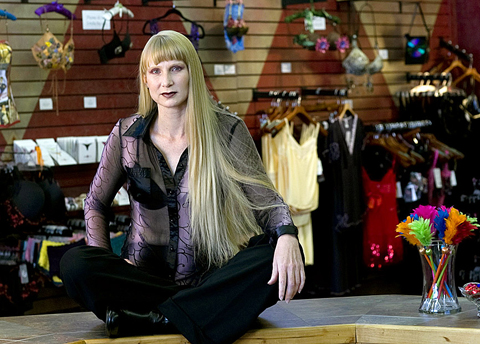The owner of a futon store outside San Francisco started running comedy shows. A comic book shop in Florida held art shows. And a lingerie shop in New Mexico is planning a men’s night later this month.
Small businesses are always searching for ways to differentiate themselves. But with fewer people out buying, some of the businesses are doing whatever they think will draw in customers.
“This is a buyer’s strike,” said Eric Flamholtz, a professor emeritus of management at the Anderson School of Management at the University of California, Los Angeles. “People are holding back and not spending any money. So you have to give them a reason to come.”

PHOTO: NY TIMES NEWS SERVICE
Holding special events also can be far less expensive than regular advertising. And in a slowing economy, advertising and marketing budgets typically get trimmed. A recent National Small Business Association survey of its members found that 49 percent planned to start new advertising or marketing this year, down from 54 percent last year.
“They’re trying to market with little or no extra money,” said Molly Brogan, the association’s vice president of public affairs. “People are doing more on the Internet, any free thing they can.”
Deborah Reese, who owns a lingerie shop in Albuquerque, New Mexico, said she opted not to increase her advertising budget this year for the first time since she opened the shop, Seventh Goddess, four years ago. Instead, she said, she developed a new Facebook page and is encouraging employee blogs. She is also planning an array of events, like a recent “Sex and the City” pajama party, in which customers sat on pillows for manicures and facials. Men’s night is coming up later this month, where employees model the store’s offerings and offer “man food.”

PHOTO: NY TIMES NEWS SERVICE
And there will be an erotic poetry reading on Valentine’s Day.
“Events are cheap publicity,” Reese said. “People who ordinarily wouldn’t come, come. You just have to spring for the munchies and drinks.”
The parties are also good for sales. Reese sold dozens of pajamas at her “Sex and the City” event and hundreds of pairs of underwear and bras at a men’s night last December. She said she always offered discounts at the special events and a portion of her sales went to local charities.
Nor are the special events just for young businesses. Even well-established businesses, like Mary’s Futons in San Rafael, California, have been feeling the pinch. Fewer people are buying new futons, and more futons are being brought in for repairs.
Mary Hughes, the owner, said she thought a comedy show would be the perfect thing to do because “everyone loves comedy and I wanted to meet women.”
A theatrical producer was less than convinced.
“‘Lady, are you crazy?’” Lisa Geduldig, the producer of Kung Pao Kosher Comedy in San Francisco remembers telling Hughes. “‘I don’t do little futon stores; I do professional venues.’”
But after Hughes cornered her and begged her to do one show, she finally agreed. The first, “An Evening of Lie-Down Comedy,” was held in March and did so well that they added a second. When that one sold out, they added another. That, too, sold out. Proceeds from the tickets go back to the comedians and Geduldig. If more than 100 people attend, Hughes gets a small percentage of the ticket sales.
“I get the publicity and that’s worth more than the money,” Hughes said, though in a later interview she said she was taking over management of the shows.
One recent Sunday night, 100 people milled around the futon store, nibbling on cake and catching up on gossip. A window display had been turned into a stage, 30 futons were turned to face it and salespeople were doing sound checks. Raffle tickets for a water fountain and beanbag chair were being sold at the door and a line of people snaked away from a sales counter doing service as a concession stand.
Geduldig threaded through the crowd to the stage, clambered on top and welcomed everyone.
“This is a futon shop,” she said. “Feel free to fall asleep.”
Everyone laughed. The show had begun.
But for every successful event, there are others that do not work out. Hughes thought she could draw 100 people to her store for a holiday sing-a-long last December. Only a few people came. At Seventh Goddess, Reese assumed a poetry writing workshop on Valentine’s Day would fill her store. Two people showed up.
Flamholtz, who is also a business consultant, said store owners should be cautious about getting into the events business.
“The problem is that business owners want to diversify, but they’ll diversify into something they don’t know anything about,” he said. “They have to add products and services that make sense around their core.”
Outside events can quickly become a second business and are rarely as simple as they appear, said Martin Lehman, a counselor and marketing director for Counselors to America’s Small Business, or Score, in New York. If a business owner wants artists to perform or exhibit their work, the business has to provide an incentive and make sure the event does not erode its brand, Lehman said. Reese noted that there were snacks to buy, bloggers to contact, community calendars to update and fliers to hand out.
Kimberly Smith-Johnson, who owned a comic book store, turned to her customers and local artists for help in putting on monthly art shows. As a former drama teacher, she turned them into her stagehands. They handed out fliers and blogged about her store.
“Events have been the best marketing tool, but they have to be genuine,” said Smith-Johnson, whose business was Comics & Classics in Jacksonville Beach, Florida. “It has to be about the artist and the event, not about bottom-line sales. People will pick up on the tone if it’s not.”
The events could not save her business and Smith-Johnson and her husband, Percy, closed the store a few weeks ago. Even though many of their comic books were inexpensive, the Johnsons could not overcome one basic problem: They opened a new store right before the economic downturn.
“We got loved to death, but people just weren’t purchasing enough to keep us going,” said Smith-Johnson, who starts a new job as an eighth-grade teacher on Monday. “We ran out of capital. Between the banks, credit cards and people not spending, we got squeezed in the middle.”
Hughes, on the other hand, seems to have hit the right note with the comedy shows. At the September show, futons were crammed with four people each, many of them laughing. One woman said: “This is the hardest I’ve laughed in a long time.”
Some said they could not believe where they were.
“This is a store I’d never come into and here I am,” said Grace Flannery, from Novato, California. “I’m looking around at these futons and they’re a lot nicer than I thought.”
Other customers seemed to agree. After some of the shows, audience members have returned to buy the exact futon they sat on.

‘CHARM OFFENSIVE’: Beijing has been sending senior Chinese officials to Okinawa as part of efforts to influence public opinion against the US, the ‘Telegraph’ reported Beijing is believed to be sowing divisions in Japan’s Okinawa Prefecture to better facilitate an invasion of Taiwan, British newspaper the Telegraph reported on Saturday. Less than 750km from Taiwan, Okinawa hosts nearly 30,000 US troops who would likely “play a pivotal role should Beijing order the invasion of Taiwan,” it wrote. To prevent US intervention in an invasion, China is carrying out a “silent invasion” of Okinawa by stoking the flames of discontent among locals toward the US presence in the prefecture, it said. Beijing is also allegedly funding separatists in the region, including Chosuke Yara, the head of the Ryukyu Independence

UNITED: The premier said Trump’s tariff comments provided a great opportunity for the private and public sectors to come together to maintain the nation’s chip advantage The government is considering ways to assist the nation’s semiconductor industry or hosting collaborative projects with the private sector after US President Donald Trump threatened to impose a 100 percent tariff on chips exported to the US, Premier Cho Jung-tai (卓榮泰) said yesterday. Trump on Monday told Republican members of the US Congress about plans to impose sweeping tariffs on semiconductors, steel, aluminum, copper and pharmaceuticals “in the very near future.” “It’s time for the United States to return to the system that made us richer and more powerful than ever before,” Trump said at the Republican Issues Conference in Miami, Florida. “They

GOLDEN OPPORTUNITY: Taiwan must capitalize on the shock waves DeepSeek has sent through US markets to show it is a tech partner of Washington, a researcher said China’s reported breakthrough in artificial intelligence (AI) would prompt the US to seek a stronger alliance with Taiwan and Japan to secure its technological superiority, a Taiwanese researcher said yesterday. The launch of low-cost AI model DeepSeek (深度求索) on Monday sent US tech stocks tumbling, with chipmaker Nvidia Corp losing 16 percent of its value and the NASDAQ falling 612.46 points, or 3.07 percent, to close at 19,341.84 points. On the same day, the Philadelphia Stock Exchange Semiconductor Sector index dropped 488.7 points, or 9.15 percent, to close at 4,853.24 points. The launch of the Chinese chatbot proves that a competitor can

‘VERY SHALLOW’: The center of Saturday’s quake in Tainan’s Dongshan District hit at a depth of 7.7km, while yesterday’s in Nansai was at a depth of 8.1km, the CWA said Two magnitude 5.7 earthquakes that struck on Saturday night and yesterday morning were aftershocks triggered by a magnitude 6.4 quake on Tuesday last week, a seismologist said, adding that the epicenters of the aftershocks are moving westward. Saturday and yesterday’s earthquakes occurred as people were preparing for the Lunar New Year holiday this week. As of 10am yesterday, the Central Weather Administration (CWA) recorded 110 aftershocks from last week’s main earthquake, including six magnitude 5 to 6 quakes and 32 magnitude 4 to 5 tremors. Seventy-one of the earthquakes were smaller than magnitude 4. Thirty-one of the aftershocks were felt nationwide, while 79